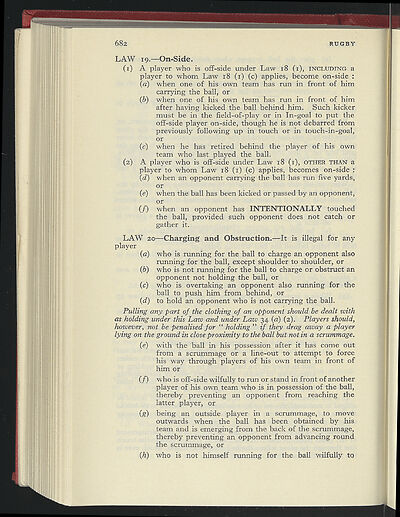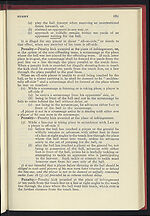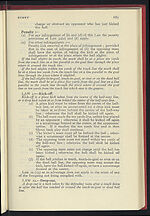1959-60
(754)
Download files
Complete book:
Individual page:
Thumbnail gallery: Grid view | List view

682 RUGBY
LAW
19.
—On-Side.
(I)
A player who is off-side under Law
18 (1), INCLUDING
a
player to whom Law
18 (1)
(c) applies, become on-side :
(a) when one of his own team has run in front of him
carrying the ball,
or
(b)
when one of his own team has run in front of him
after having kicked the ball behind him. Such kicker
must be in the field-of-play or in In-goal to put the
off-side player on-side, though he is not debarred from
previously following up in touch or in touch-in-goal,
or
(c) when he has retired behind the player of his own
team who last played the ball.
(2)
A player who is off-side under Law
18 (1), OTHER THAN
a
player to whom Law
18 (1)
(c) applies, becomes on-side :
(d) when an opponent carrying the ball has run five yards,
or
(e)
when the ball has been kicked or passed by an opponent,
or
(f)
when an opponent has INTENTIONALLY touched
the ball, provided such opponent does not catch or
gather it.
LAW
2o-
Charging and Obstruction.
—It is illegal for any
player
(a)
who is running for the ball to charge an opponent also
running for the ball, except shoulder to shoulder, or
(b)
who is not running for the ball to charge or obstruct an
opponent not holding the ball, or
(c) who is overtaking an opponent also running for the
ball to push him from behind, or
(d) to hold an opponent who is not carrying the ball.
Pulling any part of the clothing of an opponent should be dealt with
as holding tinder this Law and under Law 34 (a)
(2).
Players should,
however, not be penalised for " holding "
if
they drag away a player
lying on the ground in close proximity to the ball but not in a scrummage.
(e)
with the ball in his possession after it has come out
from a scrummage or a line-out to attempt to force
his way through players of his own team in front of
him or
(f)
who is off-side wilfully to run or stand in front of another
player of his own team who is in possession of the ball,
thereby preventing an opponent from reaching the
latter player, or
(g)
being an outside player in a scrummage, to move
outwards when the ball has been obtained by his
team and is emerging from the back of the scrummage,
thereby preventing an opponent from advancing round
the scrummage, or
(h) who is not himself running for the ball wilfully to
LAW
19.
—On-Side.
(I)
A player who is off-side under Law
18 (1), INCLUDING
a
player to whom Law
18 (1)
(c) applies, become on-side :
(a) when one of his own team has run in front of him
carrying the ball,
or
(b)
when one of his own team has run in front of him
after having kicked the ball behind him. Such kicker
must be in the field-of-play or in In-goal to put the
off-side player on-side, though he is not debarred from
previously following up in touch or in touch-in-goal,
or
(c) when he has retired behind the player of his own
team who last played the ball.
(2)
A player who is off-side under Law
18 (1), OTHER THAN
a
player to whom Law
18 (1)
(c) applies, becomes on-side :
(d) when an opponent carrying the ball has run five yards,
or
(e)
when the ball has been kicked or passed by an opponent,
or
(f)
when an opponent has INTENTIONALLY touched
the ball, provided such opponent does not catch or
gather it.
LAW
2o-
Charging and Obstruction.
—It is illegal for any
player
(a)
who is running for the ball to charge an opponent also
running for the ball, except shoulder to shoulder, or
(b)
who is not running for the ball to charge or obstruct an
opponent not holding the ball, or
(c) who is overtaking an opponent also running for the
ball to push him from behind, or
(d) to hold an opponent who is not carrying the ball.
Pulling any part of the clothing of an opponent should be dealt with
as holding tinder this Law and under Law 34 (a)
(2).
Players should,
however, not be penalised for " holding "
if
they drag away a player
lying on the ground in close proximity to the ball but not in a scrummage.
(e)
with the ball in his possession after it has come out
from a scrummage or a line-out to attempt to force
his way through players of his own team in front of
him or
(f)
who is off-side wilfully to run or stand in front of another
player of his own team who is in possession of the ball,
thereby preventing an opponent from reaching the
latter player, or
(g)
being an outside player in a scrummage, to move
outwards when the ball has been obtained by his
team and is emerging from the back of the scrummage,
thereby preventing an opponent from advancing round
the scrummage, or
(h) who is not himself running for the ball wilfully to
Set display mode to:
![]() Universal Viewer |
Universal Viewer | ![]() Mirador |
Large image | Transcription
Mirador |
Large image | Transcription
| Games and sports in the army > 1959-60 > (754) |
|---|
| Permanent URL | https://digital.nls.uk/248872840 |
|---|
| Description | 'Games and Sports in the Army' was an annual publication produced by the British War Office between the 1930s and 1960s. This included the Second World War. It outlines the rules and regulations for games and sports played by members of the armed forces. It features names and photographs of team members, and examples of contemporary advertising. |
|---|---|
| Shelfmark | GWB.52 |

